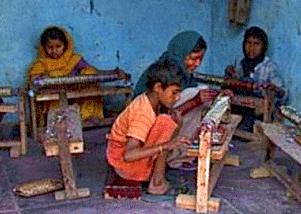 London, Oct 17: 30 million people are enslaved worldwide, trafficked into brothels, forced into manual labour, victims of debt bondage or even born into servitude, a global index on modern slavery showed on Thursday.
London, Oct 17: 30 million people are enslaved worldwide, trafficked into brothels, forced into manual labour, victims of debt bondage or even born into servitude, a global index on modern slavery showed on Thursday.
Almost half are in India, where slavery ranges from bonded labour in quarries and kilns to commercial sex exploitation, although the scourge exists in all 162 countries surveyed by Walk Free, an Australian-based rights group.
Its estimate of 29.8 million slaves worldwide is higher than other attempts to quantify modern slavery. The International Labour Organisation estimates that almost 21 million people are victims of forced labour.
"Today some people are still being born into hereditary slavery, a staggering but harsh reality, particularly in parts of West Africa and South Asia," the report said.
"Other victims are captured or kidnapped before being sold or kept for exploitation, whether through 'marriage', unpaid labour on fishing boats, or as domestic workers. Others are tricked and lured into situations they cannot escape, with false promises of a good job or an education."
The Global Slavery Index 2013 defines slavery as the possession or control of people to deny freedom and exploit them for profit or sex, usually through violence, coercion or deception. The definition includes indentured servitude, forced marriage and the abduction of children to serve in wars.
According to the index, 10 countries alone account for three quarters of the world's slaves.
After India, China has the most with 2.9 million, followed by Pakistan (2.1 million), Nigeria (701,000), Ethiopia (651,000), Russia (516,000), Thailand (473,000), Democratic Republic of Congo (462,000), Myanmar (384,000) and Bangladesh
(343,000).
The index also ranks nations by prevalence of slavery per head of population. By this measure, Mauritania is worst, with almost 4 percent of its 3.8 million people enslaved. Estimates by other organisations put the level at up to 20 percent.
Chattel slavery is common in Mauritania, meaning that slave status is passed down through generations. "Owners" buy, sell, rent out or give away their slaves as gifts.
After Mauritania, slavery is most prevalent by population in Haiti, where a system of child labour known as "restavek" encourages poor families to send their children to wealthier acquaintances, where many end up exploited and abused.
Pakistan, India, Nepal, Moldova, Benin, Ivory Coast, Gambia and Gabon have the next highest prevalence rates.
At the other end of the scale, Iceland has the lowest estimated prevalence with fewer than 100 slaves.
Next best are Ireland, Britain, New Zealand, Switzerland, Sweden, Norway, Luxembourg, Finland and Denmark, although researchers said slave numbers in such wealthy countries were higher than previously thought.
"They've been allocating resources against this crime according to the tiny handful of cases that they've been aware of," said Kevin Bales, lead researcher and a professor at the Wilberforce Institute for the Study of Slavery and Emancipation at Hull University.
"Our estimates are telling them that the numbers of people in slavery - whether it's in Great Britain or Finland or wherever - in these richer countries actually tends to be about six to 10 times higher than they think it is."
Walk Free CEO Nick Grono said the annual index would serve as an important baseline for governments and activists in the anti-slavery fight.
"This kind of data hasn't been out there before," he said. "It's a multi-year effort, and next year we'll have a much better picture of where slavery is and what changes there are. If you can't measure it, you can't devise policy to address it."
Countries with highest absolute numbers of slaves
Country Estimated slaves
India 13.9 million
China 2.9 million
Pakistan 2.1 million
Nigeria 701,000
Ethiopia 651,000
Russia 516,000
Thailand 473,000
D.R. Congo 462,000
Myanmar 384,000
Bangladesh 343,000
Ranking by prevalence of modern slavery per head of population
Rank Country Estimated slaves Population
1 Mauritania 151,000 3.8 million
2 Haiti 209,000 10.2 million
3 Pakistan 2.1 million 179.2 million
4 India 13.9 million 1.2 billion
5 Nepal 259,000 27.5 million
6 Moldova 33,000 3.6 million
7 Benin 80,000 10.1 million
8 Ivory Coast 157,000 19.8 million
9 Gambia 14,000 1.8 million
10 Gabon 14,000 1.6 million






Comments
Add new comment